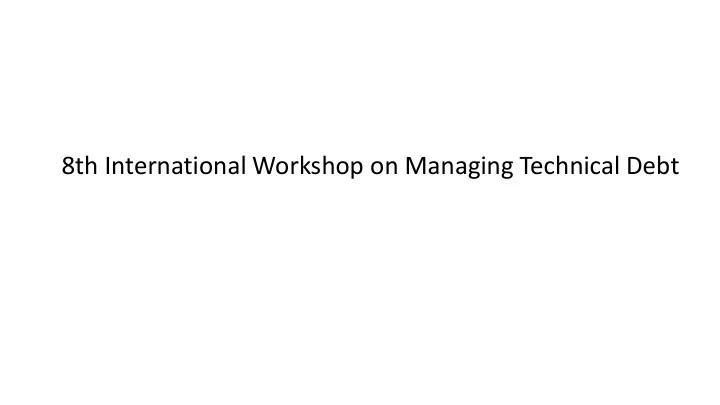

8th International Workshop on Managing Technical Debt
What is Technical Debt? In software-intensive systems, technical debt is the collection of design or implementation constructs that are expedient in the short term, but sets up a technical context that can make future changes more costly or impossible. Technical debt presents an actual or contingent liability whose impact is limited to internal system qualities, primarily maintainability and evolvability. April 2016, Dagstuhl http://mtd2016dagstuhl.org
Evolution and Convergence Some 30 years of R&D in software engineering: Software economics Software aging and decay Empirical Studies TD Risk management Qualitative methods Software metrics Program analysis Research Software quality Software architecture 3 Seaman 2013
How did we get here? Over 200 research papers and many blog posts Special issues, IEEE Software and JSS Systematic mapping studies 2010 1 st invited workshop on MTD at the SEI, mostly researchers. FSE TODAY 2016 Dagstuhl Future of Software 2013 2013 2016 seminar on 5 th MTD 4 th MTD 8 th MTD Engineering Research 2003 M. Fowler’s Managing position paper @ESEM @ICSE debt quadrants Technical Debt @ICSME 1992 2016 2016 2014 2015 2011 2012 2007 S. 1 st TDA introduced by 6 th MTD 7 th MTD Soft. 2 nd MTD 3 rd MTD McConnell’s W. Cunningham to Arch @APSEC @ICSME @ICSME @ICSE @ICSE debt types describe the need for and TD refactoring @CREST Organizations looking into developing technical debt practices Tool vendors repurposing tools to detect debt Kitchen sink syndrome by some practitioners
Where is research focused?
Where is research focused?
Where is the debt? An artifact focused treatment of technical debt identification, quantification, repayment, e.g. overall management, looks promising in avoiding the “kitchen sink” trap. • Through which artifact(s) is technical debt discovered/injected? which artifact(s) need changing to resolve the debt? • Consequently, whether a technical debt categorization/classification emerges and whether such groupings are useful in making progress requires significantly more empirical evidence • How is this relevant to practice?
Our goals today • Collectively focus on the following to contribute to a roadmap for progress • Most pressing industry problems • Most promising research approaches • Hard research questions
Agenda • Social media hash tag: #mtd16 • Keynote: Firas Glaiel • 50 Years of Technical Debt with Rising Interest Rates • Two paper session with short presentations followed by discussion • Technical Debt in Different Domains • Analyzing Technical debt • Open discussion session • Roadmap: from research to practice
Logistics • Two breaks (10:30 and 15:00) and lunch (12:30-13:30) • Workshop dinner at 18:30 at The Second Empire Restaurant http://www.second-empire.com
Vision • TD will be managed as well as we now manage defects and new features • We have a clear, operational definition of “good enough” • We have a way to translate developer concerns to manager concerns – basis for making decisions about allocating time • TD will be incurred intentionally most of the time • Projects that manage TD are more efficient, effective and sustainable than projects that don’t • Establishing support for the notion that upfront architectural work (vs. emergent architecture) is worth it • There are tools to support all aspects of TD management that are adopted and used by all stakeholders • TD-aware development (practices and tools) is an accepted way of producing software • Architectural assessment part of policy
Recommend
More recommend